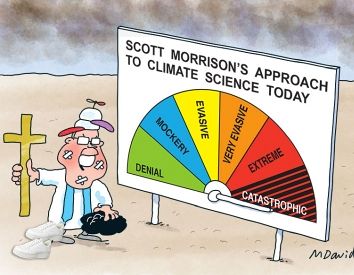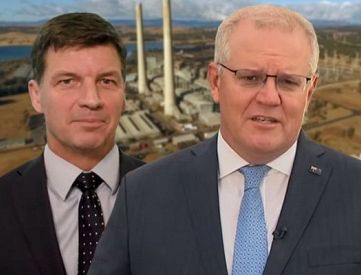Last week, the Australian Conservation Foundation released the results of their latest 'Australia’s biggest climate poll'.
The poll finds that a majority of voters in every one of Australia’s 151 electorates support climate action and overall, 65% of Australians believe action on climate change will benefit their health. However, the poll shows a high level of disagreement amongst voters as to what level of emissions reduction is appropriate in respect to net-zero and emissions reduction targets.
The poll, which was conducted online by YouGov between 17 and 31 January 2022 and surveyed 15,358 Australians over the age of 18 ultimately reveals that Australians want action on climate change. Despite this, many voters aren’t entirely convinced of the economic benefits or the impacts on the cost of living.
42% of Australians believe that climate action would be good for the economy and only 30% believe climate action would benefit their cost of living, however, 35% and 37% are neutral or simply don’t know when it comes to the impacts on the economy and living costs, respectively.
When the question of climate and economics is framed in terms of long term and short-term benefits, the results show much stronger support for climate action. 45% of Australians believe that climate action will cost the economy in the short term but then produce long term benefits, 24% of Australians believe that action on climate will strengthen the economy in both the short and long term.
48% of voters support climate action and believe the benefits outweigh the costs and 19% support action on climate even if it costs them in the short term.
With 67% of Australians supporting action on climate change regardless of the cost, the question comes down to what targets are appropriate. Despite scientific consensus and criticism from the UN Secretary-General Antonio Guterres that the emissions reduction and net-zero targets of the Government are inadequate to keep global warming below 1.5°C, 29% of Australians believe that net-zero by 2050 is sufficient and 31% believe that 25-28% reduction of emissions by 2030 is acceptable.
In addition to this, 12% believe net-zero by 2050 is too much and 10% believe a reduction of 25-28% of emissions by 2030 is also too much.
With 41% of Australians believing that net-zero by 2050 is either too much or doing enough, it would suggest that the Government won’t lose this election based purely on climate change. The latest Roy Morgan poll has Labor on track for a victory in the upcoming Federal election in May with support for the Morrison Government in decline.
Logically, this continuing shift in Australia’s two-party preferred vote must be a result of issues other than climate change due to the similarity in Labor and Liberal climate targets.
It should be noted and carefully considered that this poll was conducted both before the floods in Queensland and New South Wales and before Russia’s invasion of Ukraine.
The latest destruction of homes and lives at the hands of climate change via flooding could see those against climate action or content with the current targets change their view. Certainly, the 19% who aren’t sure what they think of Australia’s net-zero target might actually give it more thought.
As for Russia’s invasion of Ukraine, electric vehicles didn’t end the weekend as claimed by Prime Minister Scott Morrison but the increase in petroleum prices may well do so. The impact of world events on living costs might have some Australians now contemplating the economic benefits of electric vehicles, irrespective of climate change.
For the 41% and 40% of voters who believe that the Government’s net-zero and 2030 targets are too little, too late, they will have to look beyond the two major parties. The Labor Party, like the Government, has a 2050 net-zero target and their 2030 emissions reductions are only slightly better than the Coalition at 43%.
Whilst Labor’s 43% sounds a lot better than the Government’s 28%, voters should note the scientific consensus that these targets are simply inadequate.
For those dissatisfied with the targets set by the Labor and Liberal parties, The Greens policy is the most ambitious, calling for a 75% reduction in emissions by 2030. However, when it comes to dragging the two major parties towards meaningful action on climate, that may well come from a crossbench of Independents.
In Boothby, Jo Dyer’s 2030 emissions reduction target is 50%, as is that of Zoe Daniel in Goldstein. Kate Chaney in Curtin, Allegra Spender of Wentworth and Sophie Scamps in Mackellar also have 2030 targets of 50%. Kooyong’s Monique Ryan has a higher 2030 target of 60% as does current Independent MP Zali Steggall. Kylea Tink in North Sydney has a target of 50 to 60%.
Polling aside, election results are all that matters. After the Election, we will have a rough idea as to whether Australia’s 47th Parliament will be capable of taking the necessary action on climate change.
Hayden O’Connor is an I.T. professional from Tasmania who currently lives in Melbourne. You can follow Hayden on Twitter @HaydenJOConnor.
Related Articles
- Workers suffer when their employers drive climate emergency
- The 'she’ll be right' syndrome: Australia’s doomed koalas
- As climate catastrophe nears, Russia focuses on futile war
- Extreme weather and temperatures sound alarm on climate change
- People are prepared to vote for stronger climate policies
 This work is licensed under a Creative Commons Attribution-NonCommercial-NoDerivs 3.0 Australia License
This work is licensed under a Creative Commons Attribution-NonCommercial-NoDerivs 3.0 Australia License
Support independent journalism Subscribe to IA.














